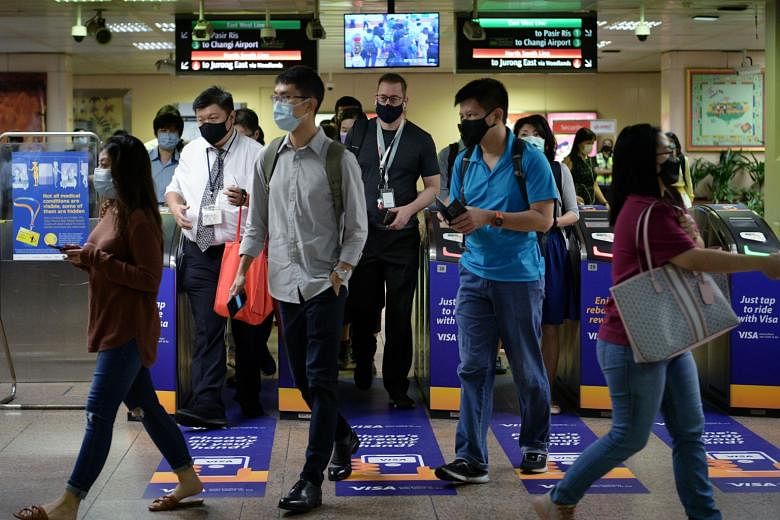SINGAPORE - A tougher stance is being taken to get more workers vaccinated, as Singapore continues to battle the Delta variant of the Sars-CoV-2 virus behind the Covid-19 pandemic.
The message is clear from new guidelines issued by the tripartite partners - the Ministry of Manpower (MOM), the National Trades Union Congress (NTUC) and the Singapore National Employers Federation (SNEF) - on Monday (Aug 23).
All employers are encouraged to require unvaccinated employees to go for regular Covid-19 testing.
Those who are medically eligible but choose not to be vaccinated can be made to pay for these tests and other extra costs they may incur, such as for test kits and stay-home notice accommodation.
These workers can also be excluded from Covid-19 medical benefits, such as insurance coverage.
Their leave entitlement could be affected too. For instance, an unvaccinated worker may be served a longer period of stay-home notice compared with a vaccinated worker.
Employers can deduct the extra days off work from the worker's leave entitlement.
The advisory by MOM, NTUC and SNEF also states that employers can implement other differentiated treatments for workers on their own accord.
They can do so as long as they are able to justify to both employees and the Government that such measures are reasonable, necessary for business operations and better protect all employees.
Before this, only some sectors such as the public service and the food and beverage sector, were required to implement this regime - named vaccinate or regular test (VoRT) - from Oct 1.
All other employers were told in an earlier July 2 advisory that they could make vaccination a requirement for workers in higher-risk appointments.
Why it matters
The updated guidelines signal a push by the authorities to further increase vaccination rates in Singapore. About 78 per cent of Singapore's population have now received both doses of the Covid-19 vaccine, while 82 per cent have received at least one dose.
Singapore has been in the preparatory stage of transition to endemic Covid-19 since Aug 10. Vaccinated individuals can dine out in groups of up to five at foodcourts and restaurants. But those who are unvaccinated can eat out in only groups of two at coffee shops and hawker centres.
Measures have been tightened and relaxed several times in the last few months, depending on the Covid-19 situation on the ground.
Experts and the multi-ministry task force handling the pandemic have said repeatedly that vaccination is key for a safe reopening. A high rate of vaccination will protect not just vaccinated individuals but also those around them, especially vulnerable seniors.
This month alone, 13 people have died of Covid-19 complications. They were mainly the elderly with underlying conditions like high blood pressure and cancer. Only one of the 13 people was fully vaccinated.
Health Minister Ong Ye Kung said on Monday that he is aware that there are those who are worried about getting vaccinated - including residents he has met - because they have underlying illnesses or fall sick easily.
He stressed, though, that in many such instances, it is even more important for them to be vaccinated because the chances of them falling very sick if infected with Covid-19 is much higher.
What lies ahead
MOM, NTUC and SNEF said employers who plan to implement the vaccinate or regular test regime should prepare their workforce early before the Oct 1 start date.
They should also let affected staff and job seekers know about the additional measures they will implement as well as the associated costs.
Even as the push continues for more to be vaccinated, the tripartite partners have made clear that employees cannot be sacked just because they are unvaccinated. Their services can, however, be terminated if they do not comply with reasonable vaccination-differentiated workplace measures.
The next few weeks will be challenging. The new guidelines will not go down well with all workers. The authorities, unions and employers will have to work closely to explain the rationale behind the move.


